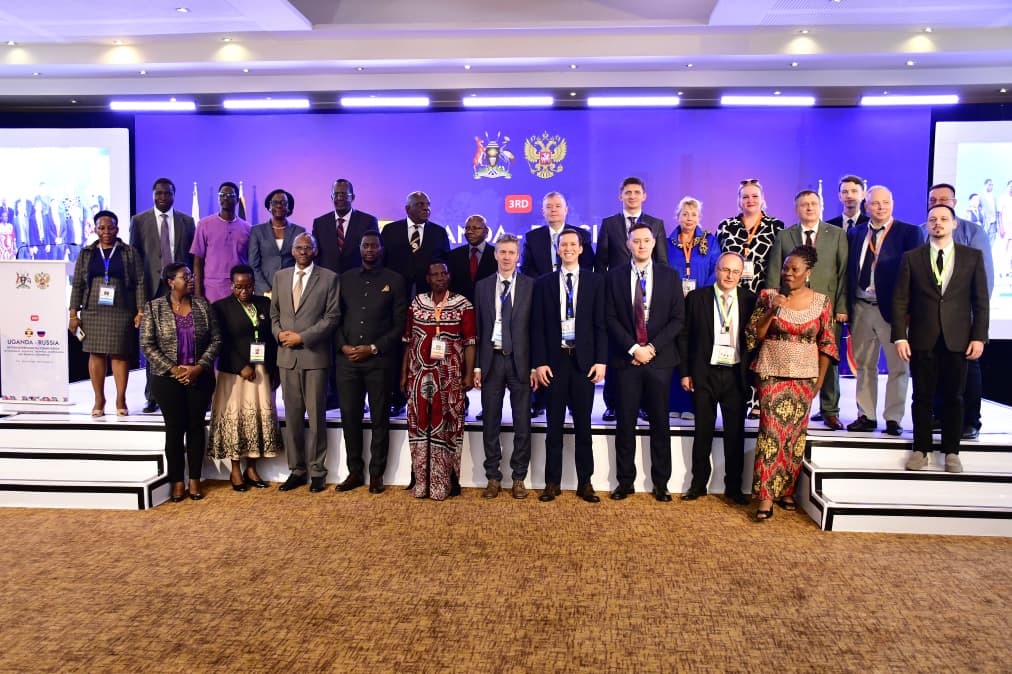Uganda and Russia galvanise relations at Kampala talks
Gen. Jeje Odongo, Uganda's foreign affairs minister, highlighted that the talks hinged on shared interests and values, emphasising the importance of promoting international peace and security, safeguarding the interests of the Global South, and respecting international law.
Both parties indicated that the talks were a crucial milestone in the bilateral relations between the two nations. (Courtesy photos)
________________
The latest Uganda-Russia talks in Kampala have been praised as a landmark for all-round cooperation between Kampala and Moscow.
Shortly after the third session of the Uganda-Russia Intergovernmental Commission on Economic and Scientific-Technical Cooperation held at Speke Resort Munyonyo in Kampala on Wednesday (October 8), both parties indicated that the talks were a crucial milestone in the bilateral relations between the two nations.
The discussions centred on trade and investment, science and technology, education, agriculture, energy, health, people-to-people exchange and defence.
Gen. Jeje Odongo, Uganda's foreign affairs minister, highlighted that the talks hinged on shared interests and values, emphasising the importance of promoting international peace and security, safeguarding the interests of the Global South, and respecting international law.
“Russia and Uganda are bound by a history of loyal friendship and mutual respect, built on the strong foundation of shared interests and values, spanning over several decades. Our two countries share similar positions on diverse issues of concern, but more especially on promotion of international peace and security, safeguarding the interests of the Global South, and respect for international law,” he said.
“We also share a common belief in the right of every nation to chart its path of development without undue interference.”
Odongo celebrated the leadership of President Yoweri Museveni and his Russian counterpart, Vladimir Putin, saying "our bilateral relations continue to grow stronger, more diversified and with concrete results that benefit our two peoples".

Museveni attended both the first and the second Russia-Africa summits and on both occasions, he held bilateral talks with Putin and applauded Russia for standing with Africa right from the independence liberation struggles.
Odongo expressed gladness with the senior officials from both sides who have reviewed and explored all areas of cooperation through the different working groups.
Uganda on January 1, 2025, officially became a partner state of the intergovernmental organisation, the BRICS, which comprises ten countries: Brazil, Russia, India, China, South Africa, Egypt, Ethiopia, Indonesia, Iran and the United Arab Emirates.
The Ugandan minister said trade between Uganda and Russia continues to grow. Russian exports to Uganda include cereals, paper, transport machinery, and industrial goods, while Uganda’s agricultural and value-added exports have found growing markets in Russia.
Both delegations expressed satisfaction with the progress achieved and underscored their shared resolve to transform dialogue into tangible outcomes that drive sustainable growth and technological advancement.
Diplomatic relations between Uganda and Russia were established on October 13, 1962, just four days after Uganda gained independence.
Russia was among the first nations to recognise Uganda’s sovereignty and has since remained a steadfast partner in the country’s development journey.
Despite the latest global geopolitical challenges occasioned by the Russia-Ukraine conflict, where the West has rigorously campaigned for the isolation of Moscow, Uganda has taken a neutral position even at international platforms such as the United Nations.
The head of the Russian delegation, Bella Cherkesova, said Russian companies are already implementing successful activities in Uganda, including Ural and Virtus Global Security companies.
She said a number of their companies, in particular NexTouch, Goznak JSC and the Techno Design Bureau, have started working on entering the Ugandan market.
“For example, Techno is considering the possibility of setting up an electric cable manufacturing enterprise in Uganda, and next year it will start training Ugandan citizens in relevant specialties on the basis of its Russian factory,” said Cherkesova.
She indicated that last year the Russian-Ugandan trade turnover increased by 17 %.
“In order to deepen cooperation, we agreed to step up cooperation between the authorised bodies of the two countries in the field of veterinary and phytosanitary surveillance in terms of expanding mutual access of agricultural products to the markets of both countries,” she said.
Cherkesova added; “In addition, we agreed that the Ugandan side will prepare a list of companies with contacts to attract potential importers of Ugandan products and exporters of Russian products. We are ready to distribute this list among business structures. I am sure that this will give an additional impetus to diversification and increase the volume of supplies.”
She said other areas of cooperation is to attract Russian companies with rich experience and have modern technologies to invest in Uganda.
“The pharmaceutical market in Uganda is interesting to Russian businesses. JSC "BIOCAD" is actively increasing the supply of medicines to Uganda and is also in the process of obtaining registration certificates for medicines to combat cancer, autoimmune and genetic diseases."
The two countries also agreed to cooperate in information and Communication Technology (ICT), defence industry, mass media, cyber security, education, including Russian language studies, health, including the treatment of cancer, sport, among others.
“We are ready to assist our Ugandan partners in developing a national anti-epidemic program to combat particularly dangerous viruses,” said Cherkesova.
The event was attended by both the Ambassador of Russia in Uganda, Vladlen Semivolos and Uganda’s Ambassador to Moscow, Moses Kizige.
“Russia and Uganda share a partnership grounded in mutual respect and a commitment to sovereign development," said Kisige.
"We take pride in the long-standing friendship between our peoples and look forward to expanding cooperation in trade, innovation, and scientific exchange. As Uganda celebrates its Independence Day, we reaffirm our unwavering support and warm congratulations to our Ugandan partners."